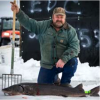Echo
Virus found in Wisconsin trout
|
State natural resource officials are wondering how a mysterious virus found its way to Wisconsin trout and what it will mean for the health of aquatic life.
Despite the uncertainty, state authorities confirm that they released 270,000 brown trout this year from hatcheries where fish tested positive for the cutthroat trout virus. An additional 160,000 had already been released last year before officials got the test results.







